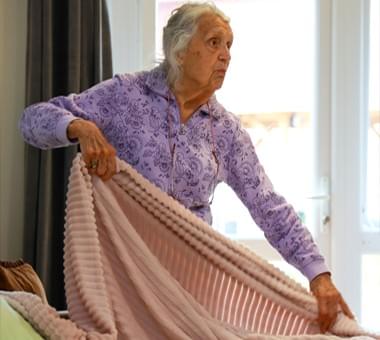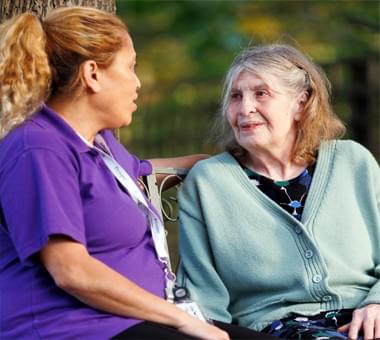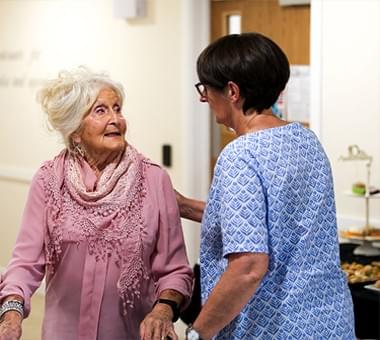
- Types of Care
- Contact Us
- Enquiry Form
- Download Brochure
- Whistleblowing Policy
- Nursing Care Near Me
- …
- Types of Care
- Contact Us
- Enquiry Form
- Download Brochure
- Whistleblowing Policy
- Nursing Care Near Me
- Types of Care
- Contact Us
- Enquiry Form
- Download Brochure
- Whistleblowing Policy
- Nursing Care Near Me
- …
- Types of Care
- Contact Us
- Enquiry Form
- Download Brochure
- Whistleblowing Policy
- Nursing Care Near Me
Early Onset Dementia Care at Foxburrow Grange
Foxburrow Grange in Colchester specialises in dementia care.

Early Onset Alzheimer's Care at Foxburrow Grange, Colchester
At Foxburrow Grange we specialise in the care for those experiencing all forms of dementia, including those with early onset (or 'young onset') forms of dementia, often most commonly Alzheimer's, of which cases are sadly increasing. Alzheimer’s disease isn’t ‘terminal’ in a conventional way, but it is progressive and incurable, meaning cognitive decline only worsens.
The term dementia is used to describe a group of symptoms – often including, but not limited to, thinking problems, confusion, or mood changes. Although often thought of as a disease of older people, it is estimated that at around 42,000 people with dementia in the UK are under 65 and something we are providing progressively more care requests for at Foxburrow Grange.
So what is early onset Alzheimer's Disease?
Alzheimer’s is the most common form of dementia. It affects your memory, thinking, and behaviour. It often progresses to the point where it affects daily activities and functions of daily life. The disease most commonly affects older adults, but it can also affect people in their 30's, 40's or 50s. When Alzheimer’s occurs in someone under age 65, it is known as early-onset dementia, or younger-onset dementia Alzheimer’s. Many affected are only in their 40s and 50s when the disease takes hold.
Alzheimer’s disease accounts for around one in three cases of young onset dementia. Around 5 in every 100 people with Alzheimer’s disease are under 65. This figure may
be higher as it can be more difficult to get an accurate diagnosis at a younger age. Most types of early-onset Alzheimer are the same, but there are a few small distinctions:
- Common Alzheimer disease.
Most people with early-onset Alzheimer’s have the common form of the condition.
The disease progresses in roughly the same way as it does in older people over the age of 65.
- Genetic (familial) Alzheimer disease.
This form is very rare. A few hundred people have genes that directly contribute to Alzheimer disease.
These people start showing symptoms of the disease in their 30s, 40s, or 50s.
What causes early-onset Alzheimer Disease?
Experts do not know what triggers the start of Alzheimer disease. They suspect that two proteins damage and kill nerve cells. Fragments of one protein, beta-amyloid, build up and are called plaques. Twisted fibres of another protein, tau, are called tangles. Almost everyone develops plaques and tangles as they age. But those with Alzheimer disease develop many, many more. At first, these plaques and tangles damage the memory areas of the brain. Over time, they affect more areas of the brain. Experts don't know why some people develop so many plaques and tangles, or how they spread and damage the brain. Family history of the disease is the only known risk factor at this time.
What are the symptoms of early-onset Alzheimer disease?
For most people with early-onset Alzheimer’s, the symptoms closely mirror those of other forms of Alzheimer disease.
Early symptoms:
- Forgetting important things, particularly newly learned information, or important dates
- Asking for the same information again and again
- Trouble solving basic problems, such as keeping track of bills or following a favourite recipe
- Losing track of the date or time of year
- Losing track of where you are and how you got there
- Trouble with depth perception or other vision problems
- Trouble joining conversations or finding the right word for something
- Misplacing things and not being able to retrace your steps to find it
- Increasingly poor judgment
- Withdrawal from work and social situations
- Changes in mood and personality
Later symptoms:
- Severe mood swings and behaviour changes
- Deepening confusion about time, place, and life events
- Suspicions about friends, family, or caregivers
- Trouble speaking, swallowing, or walking
- Severe memory loss
How is early-onset Alzheimer disease diagnosed?
The current diagnosis of early-onset Alzheimer’s relies on detecting the signs of mental decline noted above. In the first instance , families will visit the GP and be referred to the Local dementia team through the NHS.
How is early-onset Alzheimer disease treated?
Early-onset Alzheimer disease currently has no cure. But within Care homes such as Foxburrow grange , where the Montessori Model is used, we have been successful in helping people maintain their mental function, control behaviour, and enjoy the life that they have in a dignified manner.
Can early-onset Alzheimer disease be prevented?
Experts do not know how to prevent Alzheimer disease. Recently, some evidence showed that detecting the disease early can lead to better treatment options. It is best to look for any of the early warning signs mentioned above and see your GP immediately if you notice any.
Living with early-onset Alzheimer disease
Early-onset Alzheimer’s can be a difficult disease to cope with. It helps to have a positive outlook and to stay as active and mentally engaged as possible, Montessori activities and the person centre approach used enables this to happen.
It is also important to realize that you are not alone. Rely on your friends and family as much as possible. Do not be afraid to seek out a support group, if you feel that it might be helpful.
When the disease is still in its early stages, it is critical to think about the future. This can include financial planning, working with employers on current and potential job responsibilities.
Learn more about our dementia care services :
- Common Alzheimer disease.
Contact Foxburrow Grange
Reviews
Careers at Outlook Care
© Copyright Outlook Care
Outlook Care is a registered society under the Co-operative and Community Benefit Societies Act
incorporated on 24th January 1990 and recognised as charitable by HM Revenue and Customs.
Registered society number: 26988R.
Outlook Care registered office: Foxburrow Grange, Ypres Road, Colchester, Essex, CO2 7NL
Foxburrow Grange. Ypres Road. Colchester. Essex. CO2 7NL
Tel : 01206 586900
Email : foxreferrals@outlookcare.org.uk
See our other websites
Foxburrow Grange photography by James Kirk







